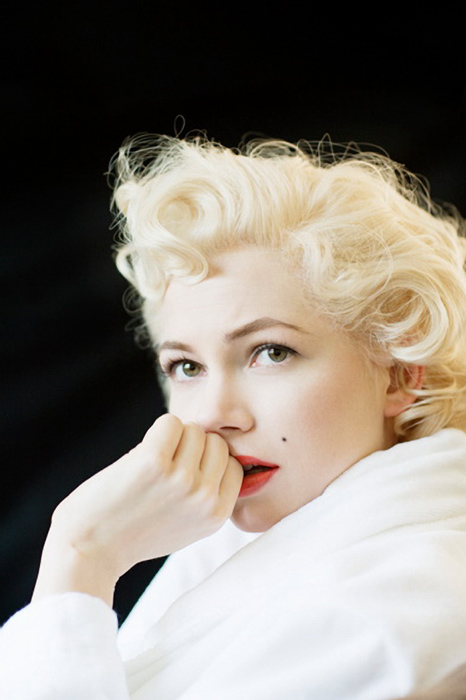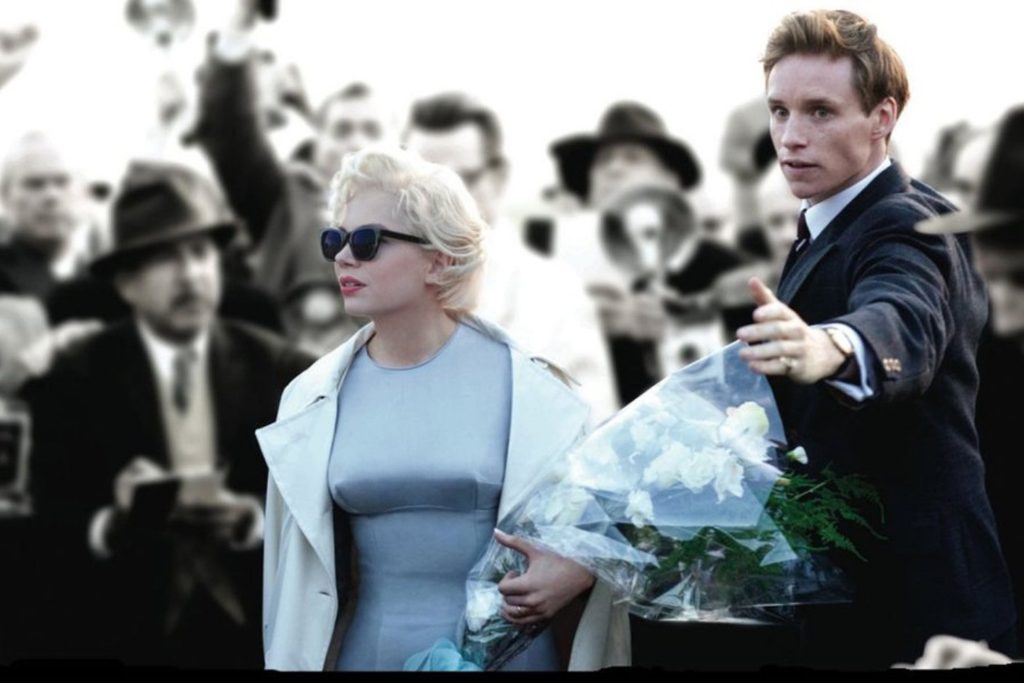My Week With Marilyn (2011)
CAST: Michelle Williams, Eddie Redmayne, Kenneth Branagh, Judi Dench, Emma Watson, Zoe Wanamaker, Dominic Cooper, Toby Jones, Dougray Scott, Julia Ormond, Derek Jacobi
REVIEW:
My Week With Marilyn is based on the memoir of Colin Clark, a production assistant on set of 1957’s The Prince and the Showgirl. It wasn’t until the 1990s that Clark, who passed away in 2002, published his account of his brief period of time spent with Marilyn Monroe. Adrian Hodges’ screenplay is a mostly faithful adaptation of Clark’s reminiscences and provides a window into both the making of a film, and his observations of a beloved but troubled starlet.
In 1956, at the height of her fame, Marilyn Monroe (Michelle Williams), still honeymooning with her new husband, playwright Arthur Miller (Dougray Scott), went to England to make a movie with Sir Laurence Olivier (Kenneth Branagh). Monroe was one of the biggest movie stars in the world, but was seeking a new project that would help her transition from her sexpot image and into a “serious actress”. Collaborating with Olivier, regarded as perhaps the greatest actor of his time, in a romantic comedy, The Prince and the Showgirl (which Olivier was both starring in and directing), seemed like a surefire proposition. But no sooner had filming gotten underway then a host of problems presented themselves, with Marilyn’s erratic behavior plaguing production, repeatedly late to set (either hiding with frazzled nerves or drinking and popping pills), getting stage fright and running away, or forgetting her lines, driving the perfectionist Olivier to distraction (nonetheless, “when Marilyn gets it right, you just don’t want to look at anyone else”, one character notes). In turn, Olivier’s criticisms intimidate the insecure woman beneath Marilyn’s effervescent facade and only make her more skittish, though her elder co-star, famed actress Dame Sybil Thorndike (Judi Dench) tries to take her under her wing and gently mentor her. Colin Clark (Eddie Redmayne), who has landed his first job in the film industry as one of Olivier’s assistants, stumbles into the role of the troubled Monroe’s confidant. Over the course of a week while Arthur Miller is out of the country, Colin and Monroe spend time together and he falls head-over-heels in love.
 My Week With Marilyn does not attempt to be a biopic of Marilyn Monroe. As its title indicates, it’s a docudrama chronicling a specific time period, providing both a peek behind the curtain of the film industry and the difficult production of one movie, and a glimpse of a starlet at the height of her fame six years away from her 1962 death by overdose, but already showing the characteristics that will lead to both her professional and personal downfall. The movie avoids the temptation to be a salacious tabloid story and doesn’t postulate some secret love affair between the starlet and the lowly assistant. Marilyn and Colin’s pseudo-fling stays chaste, despite her flirtations and a carefree interlude where they frolic in the countryside and end up skinny dipping. For her, he is a friendly face and a shoulder to cry on. For him, she is his first love.
My Week With Marilyn does not attempt to be a biopic of Marilyn Monroe. As its title indicates, it’s a docudrama chronicling a specific time period, providing both a peek behind the curtain of the film industry and the difficult production of one movie, and a glimpse of a starlet at the height of her fame six years away from her 1962 death by overdose, but already showing the characteristics that will lead to both her professional and personal downfall. The movie avoids the temptation to be a salacious tabloid story and doesn’t postulate some secret love affair between the starlet and the lowly assistant. Marilyn and Colin’s pseudo-fling stays chaste, despite her flirtations and a carefree interlude where they frolic in the countryside and end up skinny dipping. For her, he is a friendly face and a shoulder to cry on. For him, she is his first love.
The movie also touches on the dark side of fame beneath the superficial glamour, including a scene in which Marilyn’s attempt at a low-profile shopping excursion leads to getting mobbed by fans in the street and a flustered Marilyn hustled into her car, and it’s also alluded to that those around Marilyn deliberately keep her doped up and easier to control (“they don’t want their cash cow slipping away”, her bodyguard tells Colin). While Arthur Miller is a seldom-seen background figure, we get glimpses implying their new marriage is strained (Colin walks in on Marilyn having a sobbing breakdown after discovering Miller’s notes for a new play and reading into it an unflattering portrayal of herself, though it’s left ambiguous whether she’s justified in thinking that).
 While Colin Clark is the viewpoint character and Marilyn Monroe is seen through his perspective, Michelle Williams unsurprisingly is the real “star”. Williams’ casting was met with some criticism that she does not look “enough” like the real figure (a tall order for someone whose looks are as universally known as Marilyn Monroe’s), but while Williams is admittedly not a dead-ringer, she looks the part sufficiently (in my judgment, at least) after donning the iconic hairstyle, makeup, and wardrobes, and does a good enough rendition of Monroe’s voice (both speaking and singing) and mannerisms to not break the illusion (we open with Williams reenacting Monroe’s sultry performance of “We’re Having a Heatwave”, for which Williams capably performs her own singing), but her real achievement is that she presents an iconic movie star as a flesh-and-blood, three-dimensional human being. Williams brings to life the contradictory aspects of Monroe’s erratic personality, the giggling, kittenish public persona, and the damaged, troubled little-girl-lost underneath. There are times when Marilyn privately lives up to her sexpot public persona, such as a brief awkward encounter when she unabashedly lets Colin accidentally walk in on her naked in her dressing room (followed up by their skinny dipping later), but others where she is skittish and timid. Her most moving moment is when she opens up emotionally to Colin about her unhappy childhood and multiple failed marriages, and her feelings of abandonment by everyone she’s ever loved (“all everyone sees is Marilyn Monroe”, she laments, “when they realize I’m not her, they run”). It’s a juicy, challenging role, not only embodying one of the most iconic figures in Hollywood history, but also delving deeper to breathe life into a conflicted and contradictory personality, and Williams achieves it without making Monroe into either a larger-than-life icon or a caricature. Her Marilyn feels like a real person, which in itself is a worthy accomplishment and backs up the argument that inhabiting a character’s personality is more important than being their physical doppelganger.
While Colin Clark is the viewpoint character and Marilyn Monroe is seen through his perspective, Michelle Williams unsurprisingly is the real “star”. Williams’ casting was met with some criticism that she does not look “enough” like the real figure (a tall order for someone whose looks are as universally known as Marilyn Monroe’s), but while Williams is admittedly not a dead-ringer, she looks the part sufficiently (in my judgment, at least) after donning the iconic hairstyle, makeup, and wardrobes, and does a good enough rendition of Monroe’s voice (both speaking and singing) and mannerisms to not break the illusion (we open with Williams reenacting Monroe’s sultry performance of “We’re Having a Heatwave”, for which Williams capably performs her own singing), but her real achievement is that she presents an iconic movie star as a flesh-and-blood, three-dimensional human being. Williams brings to life the contradictory aspects of Monroe’s erratic personality, the giggling, kittenish public persona, and the damaged, troubled little-girl-lost underneath. There are times when Marilyn privately lives up to her sexpot public persona, such as a brief awkward encounter when she unabashedly lets Colin accidentally walk in on her naked in her dressing room (followed up by their skinny dipping later), but others where she is skittish and timid. Her most moving moment is when she opens up emotionally to Colin about her unhappy childhood and multiple failed marriages, and her feelings of abandonment by everyone she’s ever loved (“all everyone sees is Marilyn Monroe”, she laments, “when they realize I’m not her, they run”). It’s a juicy, challenging role, not only embodying one of the most iconic figures in Hollywood history, but also delving deeper to breathe life into a conflicted and contradictory personality, and Williams achieves it without making Monroe into either a larger-than-life icon or a caricature. Her Marilyn feels like a real person, which in itself is a worthy accomplishment and backs up the argument that inhabiting a character’s personality is more important than being their physical doppelganger.
Kenneth Branagh’s casting as Laurence Olivier is somewhat ironic; among Olivier’s acting pupils was Derek Jacobi (who appears here in a cameo), who in turn mentored Branagh. Branagh doesn’t submerge himself into his character to Williams’ extent—there’s times where his performance says less “Laurence Olivier” than Branagh being Branagh—but his role is also thinly-written, portraying Olivier as suave and courtly in public but a volatile perfectionist on set and a womanizer who is torn between his attraction to Monroe and wanting to strangle her as he contends with her difficult behavior and butts heads with her acting coach Paula Strasberg (Zoe Wanamaker), whom he feels exerts undue influence over Monroe (“we can’t have two directors!” he snarls). The third “lead” but the real main character is Colin Clark, played by little-known British actor Eddie Redmayne. While Colin is the viewpoint character, he is more a peripheral observer than active participant, but Redmayne understands his place, staying low-key and allowing himself to stay unobtrusively in the background. Redmayne is fine, but the role is by design not a flashy or attention-getting one. The supporting cast includes Judi Dench, playing a kinder, gentler character than her stony M in the James Bond series (despite her own fame and prestige, Dame Sybil is kind and sympathetic toward Colin and does her best to gently encourage and mentor Marilyn), Harry Potter‘s Emma Watson in the underdeveloped role of Colin’s would-be “normal” girlfriend (their half-baked subplot feels rather superfluous), Zoe Wanamaker (as Monroe’s method acting coach Paula Strasberg), Dominic Cooper (as Monroe’s business partner who resents Colin’s influence), Toby Jones (as Monroe’s fussy publicist), Dougray Scott (as her seldom-seen husband Arthur Miller), Julia Ormond (as Olivier’s wife Vivien Leigh), and a cameo from Derek Jacobi.
My Week With Marilyn won’t be of interest to everyone, but it provides an intriguing peek behind the curtain of the film industry, a docudrama true story of the making of The Prince and the Showgirl, and a character study of Marilyn Monroe. Its short runtime (a shade over an hour and a half) doesn’t outstay its welcome, and the solid acting, especially from Michelle Williams, and impeccable period detail and sense of verisimilitude makes it worth a look for anyone interested in the subject matter.
* * *
